Abstract
This research study investigates the difficulties faced by second language learners of Hazara division while comprehending English restrictive relative clauses and compares the comprehension sequences with the predictions of Subject-object hierarchy hypothesis and Noun phrase accessibility hierarchy. The study also examines the most challenging relative pronouns for second language learners of Hazara division. Data from one hundred and fifty undergraduate level students across various universities of Hazara division was analyzed. This study concludes that subject relative clauses are the easiest to comprehend, while genitive relative clauses are the most difficult, making the resultant hierarchy align with noun phrase accessibility hierarchy. On the other hand, deviation from Subject-object hierarchy can be observed, as subject-subject relative clauses are the easiest and subject-object relative clauses are the most difficult to comprehend. Additionally, the study identifies relative pronoun "whom" as the most challenging, and "when" as the easiest to comprehend.
Key Words
Subject-object Hierarchy Hypothesis, Noun Phrase Accessibility Hierarchy, Relative Clause, Relative Pronoun, English, Problems, Use
Introduction
In Pakistan, multiple languages are spoken, however, English and Urdu languages are mostly used in the media and education sectors (Ashraf, 2022) and used by different ethnic groups to communicate (Ashraf et al., 2021). Similarly, regulative, interpersonal, and innovative functions are performed using the English language (Pathan, 2010). Educational institutions in Pakistan make it a compulsion for students to possess a high level of proficiency in the English language. In order to accomplish this goal, English is taught not only at the primary or secondary level but also at the university level (Rahman, 2001). Similarly, Imran and Wyatt (2015) highlight the significance of English used as a medium of instruction in all academic fields. While learning English, learners come across many morphological, syntactic and phonetic problems. Each of these aspects is complex enough to be studied but the present study has focused on syntactic issues in learning English. There has been interest in researchers latterly in investigating problems in English relative clauses because of their intricate syntax structure, varied occurrence across languages, and frequent presence in daily discourse. These researchers have sought to explore diverse aspects of relative clauses (RCs). Some have endeavoured to assess the applicability of theories developed for RCs in native speakers to those acquiring a non-native language. Despite RCs being syntactic structures present in all languages, their distinct expressions across languages can pose challenges for learners grappling with these grammatical constructs. Various hypotheses have emerged to explain how learners acquire relative clauses. Among these, two hypotheses have garnered significant attention including Keenan and Comrie's Noun Phrase Accessibility Hierarchy Hypothesis (1977) and Hamilton's Subject-Object Hierarchy Hypothesis (1994) have been subject to extensive investigation in both native and non-native language contexts. The studies carried out on these hypotheses and the languages considered during their development did not include any languages spoken in the Pakistani region, nor did any of them involve Pakistani learners. That is why, the present study has focused on analyzing the comprehension of English restrictive relative clauses by Pakistani second language (L2) learners from Hazara division by taking into account various aspects of English restrictive relative clauses.
Purpose of the Study
RCs are an essential component of the English language. They are commonly encountered in academic and professional settings, both within Pakistan and globally. In the field of English language learning, there is a need to better understand the comprehension ability of learners in comprehending restrictive relative clauses. Despite the attention given to the subject, there is a wide gap in our understanding of English Restrictive Relative Clauses (RRCs). Regardless of its ubiquity in the language learning environment, L2 learners of the Hazara division encounter a plethora of problems because of the intricacies of English RRCs. Due to the complex syntactical nature of English RRCs, these structures have not been thoroughly addressed, particularly with regard to their usage and subtle distinctions. This study aims to address this gap by investigating the comprehension ability of English learners while learning RRCs by finding out the sequence of difficulty they face and examining the difficulty gradient of relative pronouns. By doing so, this study provides a deeper understanding of the challenges faced by L2 learners of the Hazara division in comprehending restrictive relative clauses. This research has employed Subject-Object Hierarchy Hypotheses (SOHH) and Noun Phrase Accessibility Hierarchy (NPAH) because both of these hypotheses cover the majority aspects and nitty gritty about the acquisition, comprehension, and uses of relative clauses that are significant for this research study. The rationale behind selecting only SOHH, and NPAH as the hypotheses for this research stems from their established track record as reliable predictors, having been extensively tested and acknowledged (Izumi, 2003; Kuno, 1974). The findings of the study are compared with the results of the predictions of SOHH and NPAH which provide valuable insights into the strengths and limitations of these hierarchies.
Literature Review
According to the explanation provided by Comrie (1989), a relative clause is a specific clause that modifies a head noun or pronoun by providing a description of its referent. This is exemplified in sentences (1) and (2), where the bracketed elements function as relative clauses that modify “the movie” and “my professor," respectively. As per Azar's (2002) definition, a relative clause, also known as an adjective clause, is a type of clause that functions as a dependent clause and modifies a noun. Its purpose is to provide additional information, and describe, or identify the noun in question.
1. Have you seen the movie [that won the Oscar for Best Picture]?
2. I talked to my professor, [who has written several books on the topic].
According to the analysis by Comrie (1989), relative clauses can be classified into two primary categories, restrictive (referred to as defining) and non-restrictive (alternatively known as non-defining). RRCs are a construction that denotes an event and helps to identify the referent of the word it modifies. Conversely, a non-restrictive relative clause imparts supplementary information about the referent but does not assist in its identification. This study focuses on exploring the intricate syntactic structures inherent to RRCs. Nonetheless, for the sake of enhanced clarity and broader comprehension, the more encompassing term RCs will be adopted.
In order to establish a potential natural order of relative clauses, researchers have proposed multiple hypotheses regarding their universality. These hypotheses include the NPAH, Linear Distance Hypothesis, Perceptual Difficulty Hypothesis, Structural Distance Hypothesis, Word Order Difference Hypothesis and SOHH. All of these previously mentioned hypotheses project different perspectives about RCs and play a significant role. However, this research has employed SOHH and NPAH because both of these hypotheses cover the majority aspects and nitty gritty about the acquisition, comprehension, and uses of relative clauses that are significant for this research study.
A study was conducted by Keenan and Comrie (1977) on approximately fifty languages from different parts of the world, presenting essential insights into RC formation in various languages, and identifying multiple linguistic universal constraints on RC formation. The NPAH prioritizes the locations of noun phrases that are eligible for relativization, which exhibits variation across languages. The NPAH classified RCs into six categories based on the position of the head noun and it also provided a difficulty order of RCs which indicates the increasing difficulty level of RCs. The following figure shows the hierarchy in relative clauses.
Figure 1: The hierarchy elaborated by Keenan and Comrie (1977)
Subject ? Direct Object ? Indirect Object ? Object of Adposition ? Genitive ? Object of Comparison
The following examples show relative clauses in terms of this hierarchy.
(a) Subject (SU)? Haroon’s sister who drives a car.
(b) Direct Object (DO) ? She comforted the kitten whom the puppy scared.
(c) Indirect Object (ID) ? The woman to whom he gave money is very poor.
(d) The Object of Adposition (OADP)? The apartment where Sara lives is brand new.
(e) Genitive (GEN)? The chef whose dish the critic praised is highly skilled.
(f) Object Of Comparison (OCOMP)? The horse than which the pony is swifter was sold last week.
The SOHH was proposed by Hamilton (1994), it takes into account both the role of the head noun in the main clause and the relativization that exists between the head noun and RC. This hypothesis predicts the level of difficulty in processing sentences with embedded clauses, such as centre-embedded sentences, based on the processing discontinuity caused by the relative clause to dissect the main clause, as well as phrasal boundaries that exist within the relative clause. As a result, center-embedding involves the creation of one discontinuity, while relativizing the subject leads to one discontinuity and relativizing the object results in two discontinuities. O'Grady (2003) proposed it as a hybrid hypothesis that integrates two separate hypotheses: the NPAH and the PDH. Hamilton's (1994) findings based on a sentence combination test administered to adult L2 learners, provided support for his hypothesis. According to the SOHH, the order of difficulty for embedded sentences is OS > OO = SS > SO, with SS and OO being equally difficult due to containing three discontinuities. SO is predicted to be the most challenging since it incorporates four discontinuities, while OS is expected to be the easiest. The sentences below serve to illustrate this point.
SS= The musician who won the competition is a colleague of mine.
SO= The park in which the children play is beautifully landscaped.
OO= Emily admires the painting that hung in the museum.
OS= He met the man whom she was talking about.
Koçak's (2020) study examined the difficulties faced by Turkish learners while learning English as a Foreign Language (EFL) in recognizing RRCs and the impact of instructions on their acquisition. The study also assessed the level of difficulty of different types of relative clauses. Moreover, this study also investigated the difficulty level of different types of RRCs. The results of this revealed that Turkish EFL learners were good at recognizing RRCs and explicit instructions had a positive impact on the recognition of RRCs. In addition, this study also showed that in relation to NPAH, the results indicated that SU RCs were the easiest for participants to recognize. In a study conducted by Alotaibi (2016), the primary aim was to investigate the ability of Kuwaiti EFL learners to grasp English RCs. The study sought to assess the participant's comprehension of the structure of RCs in English, employing a sentence combination Test as the assessment tool. The study's conclusion highlighted notable differences in the accuracy of RC production between the two proficiency groups, indicating a correlation between proficiency in English and RC usage accuracy. Interestingly, the study's findings revealed that both groups made various errors when completing the task, but there was a discernible discrepancy in the number of correct responses produced, depending on the learners' English proficiency levels. Notably, participants exhibited fewer errors when tasked with relativizing the head noun in the subject position, thereby supporting the conventional acquisition hierarchy. In relation to SOHH, the results indicated that OS RCs were the easiest for participants to relativize.
A study undertaken by Khan and Al-Namer (2017), purposed to investigate Arab EFL learners' comprehension of RRCs. The objective of the research was to identify the most problematic relative pronouns from the seven selected pronouns. Moreover, it also measured the effect of English proficiency on their performance. The required data was collected by multiple choice test. The results of this study concluded that the most problematic pronoun to comprehend was "whom". Furthermore, the research also revealed that English proficiency played a vital role as more advanced learners were able to comprehend RRCs more efficiently. It is evident from the reviewed literature that while various research studies have explored different aspects of RCs, the topic remains significantly under-researched in the Pakistani context. Notably, there is the absence of any research investigating the comprehension of English RRCs specifically among Pakistani L2 learners, including those from the Hazara division. This study aims to bridge this extensive research gap by thoroughly investigating the specific sequence of difficulty encountered by L2 learners from the Hazara division in comprehending English restrictive relative clauses. Despite the regular exposure to RRCs in academic and professional settings, a comprehensive exploration of the varying levels of difficulty faced by these learners when dealing with different types of RRCs has not been undertaken. Additionally, the mentioned researches lack comparisons between the resultant difficulty sequence of L2 learners in the Hazara division and the predictions of the SOHH and NPAH, thereby leaving uncertainties about the applicability and accuracy of these theoretical frameworks for this particular region. Furthermore, the usage of relative pronouns and their impact on the overall comprehension difficulty experienced by L2 learners from the Hazara division while dealing with RRCs have not been adequately addressed.
Methodology
The primary focus of this study was to investigate the comprehension ability of L2 learners in the Hazara division when it comes to understanding English RCs. The study aimed to identify the difficulty sequence of English RRCs among L2 learners in the Hazara division and compared it with the predictions made by the SOHH and NPAH. Furthermore, the study intended to evaluate the relative pronouns in English that pose the greatest challenges for L2 learners in the Hazara division in terms of comprehension. To achieve these objectives, the study adopted a survey descriptive research design. Survey descriptive research aims to describe or explain phenomena as they naturally occur, without manipulating variables. It focuses on observing and documenting existing characteristics, behaviours, or conditions. In this research study, the descriptive research design allowed the researchers to systematically collect data on the comprehension ability of L2 learners in the Hazara division. This design helped in providing a detailed picture of the learners' performance and understanding, as well as identifying patterns or difficulties they may encounter with English RRCs. The population of this study were all undergraduate-level students of the Hazara Division. A representative sample size of one hundred and fifty students through a non-random and convenience sampling procedure was selected from the 5th, 6th, 7th, and 8th semesters of the BS English program from Hazara University, Abbottabad University of Science and Technology, and Haripur University. A proficiency test was adapted from Khan and Al-namer (2017) for the analysis of the difficulty gradient of relative pronouns, from Baysal (1999) for testing the predictions of NPAH and from Hassan (2018) for analyzing the predictions of the SOHH. The overall test included in this study had three portions, i.e., a multiple choice (to analyze the difficulty gradient of relative pronouns), a grammaticality judgment test (GJT) (to test participant's intuitional knowledge) and a sentence combination test (SCT) (to test participant's productive capacity) portion. The multiple-choice portion adopted from Khan and AL-namer had 21 items in total, which were evenly distributed among 7 types of relative pronouns, i.e., who, whom, whose, which, that, where, and when. Moreover, for NPAH both SCT and GJT, the test included 20 items each, consisting of subject, direct object, indirect object, oblique, and genitive sentences, with 4 sentences for each division. Additionally, for SOHH, the test contained 16 items for each SCT and GJT, evenly divided into four categories, i.e., OS, OO, SS, and SO. All the correct answers were awarded numeric number 1 and the incorrect answers were awarded 0. The data was statistically calculated for further analysis. In accordance with the objectives of this study, the calculation of percentages for various variables was undertaken to address the research objectives effectively.
Results
To find out the sequence of difficulties faced by L2 learners of the Hazara division while comprehending English RRCs, this research study collected data through three portions of the proficiency test. These portions were designed to judge the participant's comprehension and production ability of relative clauses based on the types of RCs explained by NPAH and SOHH. To analyze the predictions of NPAH and SOHH, GJT was utilized to test the intuitional knowledge and SCT was practised to test the productive capacity of the participants. Moreover, multiple-choice tests judged the overall knowledge of participants about relative pronouns. The difficulty level of comprehension for seven pronouns was measured. The data analyzed for each pronoun showing its relative level of difficulty was measured. The following figure shows the results of multiple-choice questions in the test.
Figure 1

The above figure clearly demonstrates the varying levels of difficulty in the correct use of relative pronouns. The relative pronoun "when" emerged as the easiest to use, as it received a significantly higher correct response rate of 51.1% compared to other relative pronouns. The incorrect responses for this pronoun were less than the correct responses suggesting that students had relatively less difficulty in comprehending this pronoun. The relative pronoun "that" ranked second in terms of comprehension ease, with a 38% accuracy rate in participant responses. The relative pronouns "where," "which," "who," and "whose" displayed an increasing order of difficulty, with correct response percentages of 35.3%, 31.3%, 29.1%, and 24% respectively. Notably, the relative pronoun "whom" proved to be the most challenging for participants to use correctly. Only 16% of responses were correctly provided for this pronoun while 84% were found incorrect. The following diagram indicates the difficulty gradient of relative pronouns, starting from the least "when” complicated relative pronoun to the most complicated “whom”.
Figure 2

In this study, two tests, namely the GJT and SCT, were employed to assess the participant's comprehension ability based on the hierarchical framework proposed by NPAH. The analysis of these tests is outlined below
Figure 3
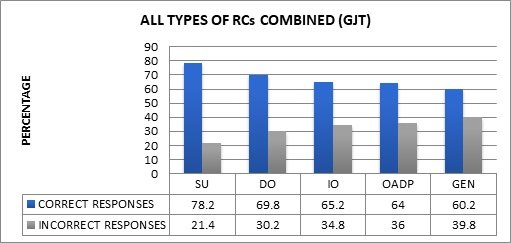
The bar chart depicted above displays the distribution of percentages for all types of RCs in GJT. Notably, SU RCs exhibit the highest percentage (78.2%) of correct responses. This suggests that participants found it comparatively easier to determine the grammaticality of sentences containing SU RCs when compared to others. The DO RCs ranked second in terms of comprehension ease, with 69.8% of correct responses. ID RCs follow at the third position, with 65.2% of correct responses. The OADP RCs secured fourth place in the hierarchy, with 64% of correct responses, indicating a slightly lower level of ease in comprehending these types of clauses. The GEN RC's correct use was at the bottom with a mere 60.2% of correct responses. This clearly shows that these participants found out GEN RCs to be the most challenging while recognizing the grammaticality of RRCs.
Figure 4
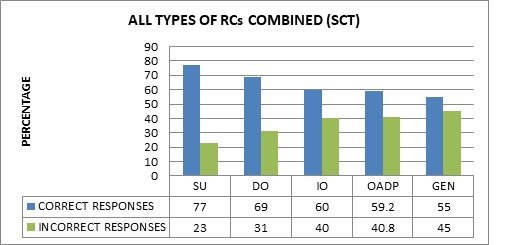
The bar chart presented above illustrates the distribution of percentages representing various types of RCs combined within the SCT. Notably, SU RCs were found to with the highest percentage (78.2%) of accurate responses. This indicates that participants found it relatively easier to combine the provided sentence containing SU RCs compared to others. The DO RCs ranked second in terms of comprehension ease, with 69.8% of correct responses. The ID RCs followed in the third position, with 65.2% of correct responses. The OADP RCs secured the fourth position, with 64% of correct responses, indicating a slightly lower level of ease in combining the sentences provided in SCT. The GEN RCs ranked at the lowest with only 60.2% of correct responses. This clearly indicates that participants found GEN RCs to be the most challenging when it comes to successfully merging the sentences using the relative pronouns provided in the sentence combination test compared to other types of relative clauses. The following figure presents the combined results of GJT and SCT.
Figure 5
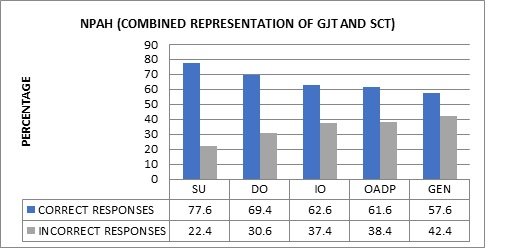
The above figure shows the results of the data specifically designed for NPAH. The findings from the data analysis of NPAH-designed tests undeniably revealed distinct patterns of comprehensibility among different types of RCs. SU RCs exhibited the highest level of comprehensibility, with a significantly higher percentage of correct responses at 77.6% compared to other RC types specified by NPAH. Following the SU RCs, DO RCs fall in the middle range of the comprehension ease graph, with a 69.4% correctness rate in participant responses. RCs with ID and OADP ranked at the third and fourth positions respectively with correct response percentages of 62.6% and 61.6%. Conversely, the most complex type of relative clause to comprehend, according to the collected data, was GEN RCs, with a correct response percentage of only 57.6%, the lowest among the various RCs examined. With the help of these findings, the following difficulty sequence (moving from the easiest to the most difficult) can be drawn for the analysis based on NPAH.
Figure 6
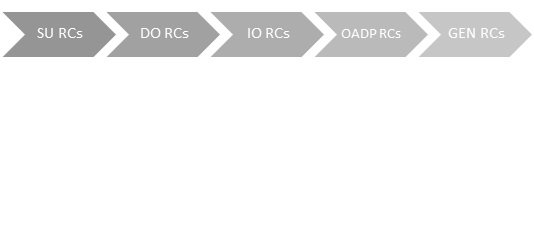
Similarly, this study utilized two assessments, the GJT and SCT, to evaluate participants' comprehension skills according to the hierarchical framework suggested by SOHH. The subsequent section presents a breakdown of the analysis conducted on these tests.
Figure 7
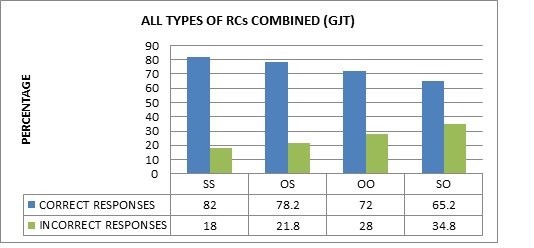
Displayed in the bar chart provided, the distribution of percentages concerning various types of RCs within the GJT can be observed. Notably, SS RCs exhibited the highest percentage of correct responses at 82%. This indicates that participants found it out relatively easier to determine the grammaticality of sentences containing SS RCs compared to other types. Moving on, OS RCs ranked second in terms of comprehension ease, with 78.2% of correct responses. Following that, OO RCs stood at the third position in the hierarchy, with 72% of correct responses, suggesting a slightly lower level of ease in comprehending this type of clause. Conclusively, SO RCs ranked at the bottom, with a mere 65.2% of correct responses. This clearly highlights that the participants found SO RCs to be the most challenging when it comes to recognizing their grammatical correctness compared to other types of RCs. The following figure shows the result for SCT (SOHH).
Figure 8
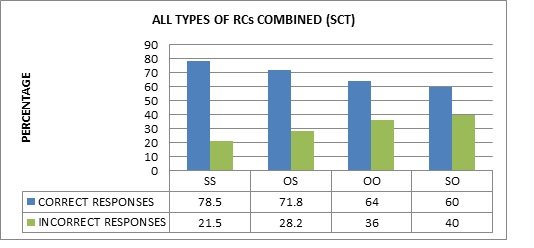
The bar chart provided illustrates the distribution of percentages for different types of RCs that were analyzed using SCT. It is noteworthy that SS RCs exhibited the highest percentage of correct responses, reaching 78.5%. This suggests that participants found it out relatively easier to combine the sentences containing SS RCs compared to other types. The OS RCs ranked second in terms of comprehension ease, with 71.8% of correct responses. Following that, OO RCs took the third position, with 64% of correct responses, indicating a slightly lower level of ease in comprehending this particular type of clause. The SO RCs ranked at the bottom, with only 60% of correct responses. This clearly indicates that participants found SO RCs to be the most challenging when it comes to merging and structuring sentences accurately. The following figure shows the results for GJT and SCT (SOHH).
Figure 9
Figure 9

The above figure shows the results obtained from the tests to judge the comprehension ability of participants based on the RC types framed out by SOHH. The findings of the analysis clearly demonstrate that SS RCs are the most comprehensible, with a significantly higher percentage of correct responses at 80.3% compared to other types of RCs as specified by SOHH. Following SS RCs, OS RCs occupy the second position on the comprehension ease graph, achieving a 75% correctness rate in participants’ responses. In terms of comprehensibility, OO RCs ranked third with a correct response percentage of 68%. On the other hand, according to the collected data, the most challenging type of RCs to comprehend are the SO RCs, with a correct response percentage of only 62.6%, which is the lowest compared to other types of RCs. In conclusion, a sequence of difficulty can be established based on these findings, indicating the relative ease or difficulty of comprehending different types of RCs, from the most easily understood SS RCs to the most challenging SO RCs. In light of the findings of the present study, the following SOHH hierarchy was derived.
Figure 10

In order to determine the extent to which the resultant difficulty sequence of L2 learners of Hazara division matched the prediction of SOHH and NPAH, this research study utilized two sets of tests and the results of these tests were used to draft out a difficulty sequence and then compared it with the hierarchies demonstrated by NPAH and SOHH. These tests were specifically designed to assess participants' comprehension abilities regarding different types of RCs as outlined by NPAH and SOHH. The findings clearly revealed specific patterns regarding how different types of RCs were understood. SU RCs demonstrated the highest level of comprehensibility, with a significantly higher percentage of correct responses at 77.6% compared to other RC types specified by NPAH. Following SU RCs, DO RCs occupied the middle range on the comprehension ease graph, garnering a 69.4% correctness rate in participant responses. RCs with ID and OADP ranked third and fourth, respectively, with correct response percentages of 62.6% and 61.6%. Conversely, the most intricate type of RC to comprehend, as indicated by the collected data, was GEN RC, with a correct response percentage of only 57.6%—the lowest among the various RCs examined. These findings allow for the construction of a difficulty sequence based on NPAH, moving from the easiest to the most challenging relative clauses.
Figure 11

When compared with the hierarchy demonstrated by NPAH, it became evident that L2 learners in the Hazara division exhibited the same difficulty sequence as observed in NPAH's findings. The original analysis carried out by Keenan and Comrie (1977) also elucidates that the easiest type of RC to comprehend is SU RCs and the most difficult one is GEN RCs (excluding OCOMP not included in this study). In light of the findings in the present study, the following NPAH hierarchy was derived.
Figure 12
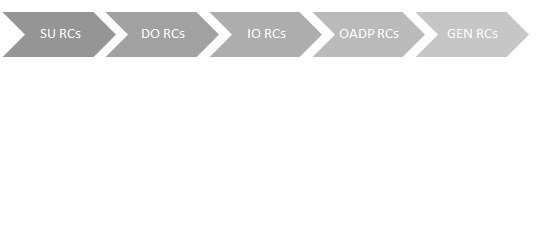
In the above figure, the NPAH hierarchy was derived from results obtained from the tests administered to assess the participants' comprehension ability based on the relative pronoun types outlined by SOHH. The findings of this research clearly indicate that SS RCs were the most easily comprehended, with a significantly higher percentage of correct responses at 80.3% compared to other types of RCs, as specified by SOHH. Following SS RCs, OS RCs occupied the second position on the comprehension ease graph, with a 75% correctness rate in participant responses. In terms of comprehensibility, OO RCs ranked third, with a correct response percentage of 68%. Conversely, according to the collected data, the most challenging type of RCs to comprehend were the SO RCs, with a correct response percentage of only 62.6%, the lowest among the different types of RCs examined. In conclusion, based on these findings, a sequence of difficulty was established, indicating the relative ease or difficulty of comprehending different types of relative clauses, from the most easily comprehended to the most challenging. Similarly, the data from the present study are compared with the data for SOHH's original hierarchy. The following figure shows the SOHH original hierarchy.
Figure 13
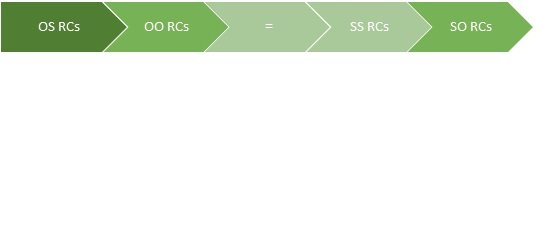
The difficulty sequence derived from this research study does not entirely align with the findings of the original study conducted by Hamilton (1994). That is why, in the light of the findings of the present study, the following SOHH hierarchy was derived which was not the same as the original SOHH hierarchy.
Figure 14

While both studies observed that SO RCs were the most challenging for participants to comprehend, there were differences in the overall sequence. According to Hamilton (1994), OS RCs were considered the easiest to comprehend, whereas this study's data analysis concluded that participants found SS RCs to be the most easily understood. Additionally, Hamilton (1994) classified OO and SS RCs as having similar difficulty, whereas this study's findings did not exhibit such symmetry. Similarly, Hamilton (1994) regarded OS RCs as the least challenging, whereas this study positioned OS RCs as the second easiest among the RC types framed out by SOHH.
Conclusion
The present study investigated the degree to which L2 learners of the Hazara division comprehended English RRCs. The problems for students in learning RCs were identified. The study also examined the relative pronouns that posed the most challenges for L2 learners of the Hazara division. The study identified the relative pronouns that posed difficulties for L2 learners, with "whom" being the most challenging and "when" being the easiest to comprehend. The findings of this study revealed distinct patterns of comprehensibility for different types of RCs according to both NPAH and SOHH. Specifically, in NPAH, the SU RCs demonstrated the highest levels of comprehension, while GEN RCs posed the greatest challenge. Moreover, in the SOHH examination, SS RCs revealed to be the easiest and SO RCs were the most difficult ones. The study also examined the extent to which the obtained difficulty sequence aligned with the predictions of NPAH and SOHH. The results indicated a general match with NPAH but deviations from the original SOHH predictions. The study concludes that learners often exhibit varying levels of proficiency when comprehending different linguistic structures. This variation indicates that learners have already acquired some structures, signifying their readiness to tackle more complex aspects within those structures. The study reinforces this idea by demonstrating that participants could comprehend certain items easily while facing difficulties with others, all falling under the same basic structure of RCs. A key takeaway from this research is the concept of cognitive readiness among learners. This suggests that learners may struggle with increasingly complex structures within the same category. To address this, it is advisable to assess learners' existing knowledge and gradually introduce more complex structures to build upon their current understanding. Additionally, the study highlights a common shortcoming in the design of grammar books and syllabi, which often rush through numerous structures without addressing their intricacies or the complexities within those structures. To improve this, it is recommended to adopt an approach like the Spiral Method, where instructors revisit and add complexities to structures over time. This method allows learners to not only grasp the fundamental aspects but also master the complexities within those structures. Incorporating these insights into language teaching and assessment can lead to more effective and tailored pedagogical approaches, enhancing learners' language acquisition experiences.
References
- Alotaibi, A. M. (2016). Examining the learnability of English relative clauses: Evidence from Kuwaiti EFL learners. English Language Teaching, 9(2). 57- 65. https;//doi,org/10.5539/elt.v9n2p57
- Ashraf, H. (2022). The ambivalent role of Urdu and English in multilingual Pakistan: a Bourdieusian study. Lang Policy, 22, 25-48. https://doi.org/10.1007/s10993-022-09623-6
- Ashraf, M. A., Turner, A. D., & Laar, A. R. (2021). Multilingual language practices in education in Pakistan: The conflict between policy and practice. Sage Journals, 11(1), 1-14. https://doi.org/10.1177/21582440211004140
- Azar, B. S. (2002). Understanding and using English grammar (3rd ed.). Longman.
- Baysal, A. (1999). The noun phrase accessibility hierarchy (NPAH) is the acquisition of English restrictive relative clauses by Turkish adult learners of English (Unpublished doctorate dissertation). EskiÅŸehir Anadolu University.
- Comrie, B. (1989). Language universals and linguistic typology. University of Chicago Press.
- Hamilton, R. L. (1994). Is implicational generalization unidirectional and maximal: Evidence from relativization instruction in a second language. Language Learning, 44 (1), 123-157. https://doi.org/10.1111/j.1467-1770.1994.tb01451.x
- Hassan, I. H. (2018). Investigating the acquisition order of English restrictive relative clauses: Evidence from Egyptian EFL learners. Faculty of Education Journal Alexandria University, 28(1), 313- 343. https://doi.org/10.21608/jealex.2018.156732
- Imran, S., & Wyatt, M. (2015). Pakistani university English teachers’ cognitions and classroom practices regarding their use of the learners’ first languages. Asian EFL Journal, 17(1), 138-179.
- Izumi, S. (2003). Processing difficulty in comprehension and production of RCs by learners of English as a second language . Language Learning, 53(2), 72- 83. https://doi.org/10.1111/1467-9922.00218
- Keenan, E. L., & Comrie, B. (1977). Noun phrase accessibility and universal grammar. Linguistic Inquiry, 8(1), 63-99. https://www.jstor.org/stable/4177973
- Khan, S. S., & Al-Namer, L. A. S. (2017). The comprehension of English relative clauses by Arabic-speaking EFL learners . International Journal of Education, 9(1), 92-207. https://doi.org/10.5296/ije.v9i1.11025
- Koçak, A. (2020). Turkish tertiary level EFL learners’ recognition of relative clauses. Journal of Language and Linguistic Studies, 16(4), 1637-1655
- Kuno, S. (1974). The position of relative clauses and conjunctions. Linguistic Inquiry, 5(1), 117-136. https://www.jstor.org/stable/4177810
- Pathan, H., Shahriar, A., & Mari, M. A. (2010). Motivation for learning English in Pakistan. EFL Annual Research Journal SALU, 12(2), 75-91.
- Rahman, T. (2001). English-teaching institutions in Pakistan. Journal of Multilingual and Multicultural Development, 22(3), 242-261. https://doi.org/10.1080/01434630108666435
- Alotaibi, A. M. (2016). Examining the learnability of English relative clauses: Evidence from Kuwaiti EFL learners. English Language Teaching, 9(2). 57- 65. https;//doi,org/10.5539/elt.v9n2p57
- Ashraf, H. (2022). The ambivalent role of Urdu and English in multilingual Pakistan: a Bourdieusian study. Lang Policy, 22, 25-48. https://doi.org/10.1007/s10993-022-09623-6
- Ashraf, M. A., Turner, A. D., & Laar, A. R. (2021). Multilingual language practices in education in Pakistan: The conflict between policy and practice. Sage Journals, 11(1), 1-14. https://doi.org/10.1177/21582440211004140
- Azar, B. S. (2002). Understanding and using English grammar (3rd ed.). Longman.
- Baysal, A. (1999). The noun phrase accessibility hierarchy (NPAH) is the acquisition of English restrictive relative clauses by Turkish adult learners of English (Unpublished doctorate dissertation). EskiÅŸehir Anadolu University.
- Comrie, B. (1989). Language universals and linguistic typology. University of Chicago Press.
- Hamilton, R. L. (1994). Is implicational generalization unidirectional and maximal: Evidence from relativization instruction in a second language. Language Learning, 44 (1), 123-157. https://doi.org/10.1111/j.1467-1770.1994.tb01451.x
- Hassan, I. H. (2018). Investigating the acquisition order of English restrictive relative clauses: Evidence from Egyptian EFL learners. Faculty of Education Journal Alexandria University, 28(1), 313- 343. https://doi.org/10.21608/jealex.2018.156732
- Imran, S., & Wyatt, M. (2015). Pakistani university English teachers’ cognitions and classroom practices regarding their use of the learners’ first languages. Asian EFL Journal, 17(1), 138-179.
- Izumi, S. (2003). Processing difficulty in comprehension and production of RCs by learners of English as a second language . Language Learning, 53(2), 72- 83. https://doi.org/10.1111/1467-9922.00218
- Keenan, E. L., & Comrie, B. (1977). Noun phrase accessibility and universal grammar. Linguistic Inquiry, 8(1), 63-99. https://www.jstor.org/stable/4177973
- Khan, S. S., & Al-Namer, L. A. S. (2017). The comprehension of English relative clauses by Arabic-speaking EFL learners . International Journal of Education, 9(1), 92-207. https://doi.org/10.5296/ije.v9i1.11025
- Koçak, A. (2020). Turkish tertiary level EFL learners’ recognition of relative clauses. Journal of Language and Linguistic Studies, 16(4), 1637-1655
- Kuno, S. (1974). The position of relative clauses and conjunctions. Linguistic Inquiry, 5(1), 117-136. https://www.jstor.org/stable/4177810
- Pathan, H., Shahriar, A., & Mari, M. A. (2010). Motivation for learning English in Pakistan. EFL Annual Research Journal SALU, 12(2), 75-91.
- Rahman, T. (2001). English-teaching institutions in Pakistan. Journal of Multilingual and Multicultural Development, 22(3), 242-261. https://doi.org/10.1080/01434630108666435
Cite this article
-
APA : Waseem, M., Rahman, G., & Arshad, S. (2023). Analysis of the Problems in the Use of English Restrictive Relative Clauses by Second Language Learners of Hazara Division. Global Regional Review, VIII(III), 52-65. https://doi.org/10.31703/grr.2023(VIII-III).06
-
CHICAGO : Waseem, Muhammad, Ghani Rahman, and Sabahat Arshad. 2023. "Analysis of the Problems in the Use of English Restrictive Relative Clauses by Second Language Learners of Hazara Division." Global Regional Review, VIII (III): 52-65 doi: 10.31703/grr.2023(VIII-III).06
-
HARVARD : WASEEM, M., RAHMAN, G. & ARSHAD, S. 2023. Analysis of the Problems in the Use of English Restrictive Relative Clauses by Second Language Learners of Hazara Division. Global Regional Review, VIII, 52-65.
-
MHRA : Waseem, Muhammad, Ghani Rahman, and Sabahat Arshad. 2023. "Analysis of the Problems in the Use of English Restrictive Relative Clauses by Second Language Learners of Hazara Division." Global Regional Review, VIII: 52-65
-
MLA : Waseem, Muhammad, Ghani Rahman, and Sabahat Arshad. "Analysis of the Problems in the Use of English Restrictive Relative Clauses by Second Language Learners of Hazara Division." Global Regional Review, VIII.III (2023): 52-65 Print.
-
OXFORD : Waseem, Muhammad, Rahman, Ghani, and Arshad, Sabahat (2023), "Analysis of the Problems in the Use of English Restrictive Relative Clauses by Second Language Learners of Hazara Division", Global Regional Review, VIII (III), 52-65
-
TURABIAN : Waseem, Muhammad, Ghani Rahman, and Sabahat Arshad. "Analysis of the Problems in the Use of English Restrictive Relative Clauses by Second Language Learners of Hazara Division." Global Regional Review VIII, no. III (2023): 52-65. https://doi.org/10.31703/grr.2023(VIII-III).06
